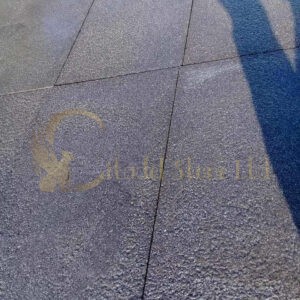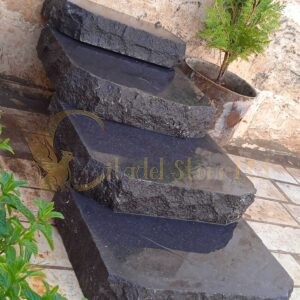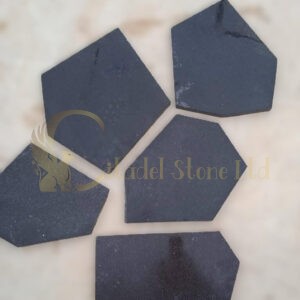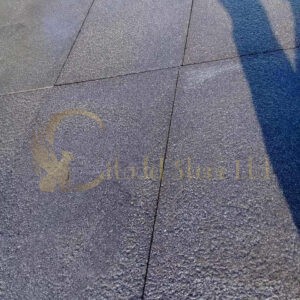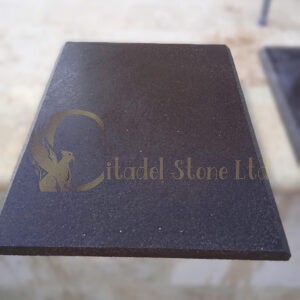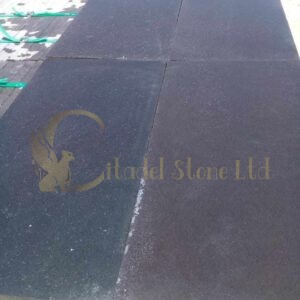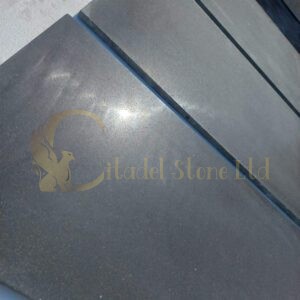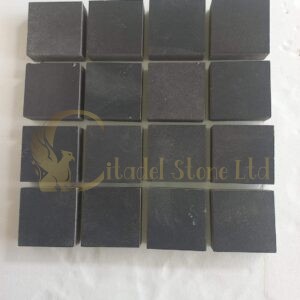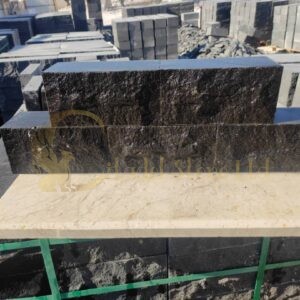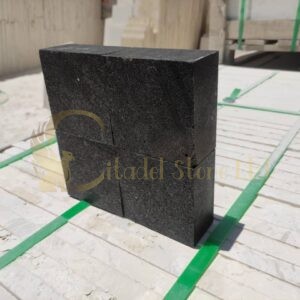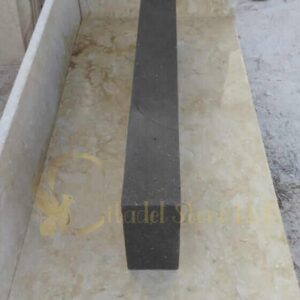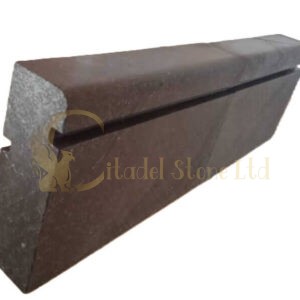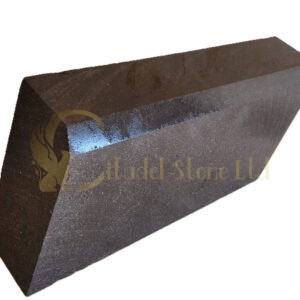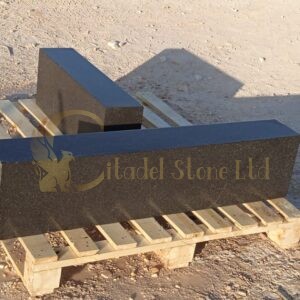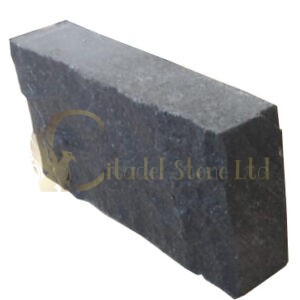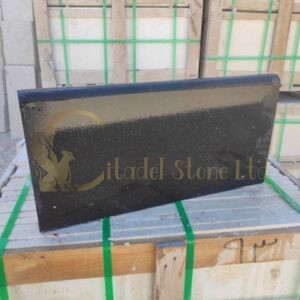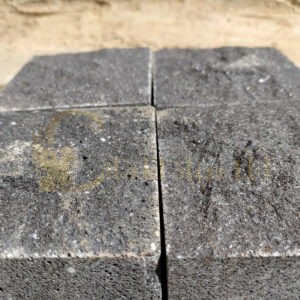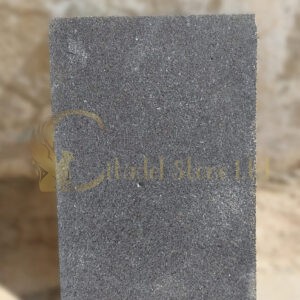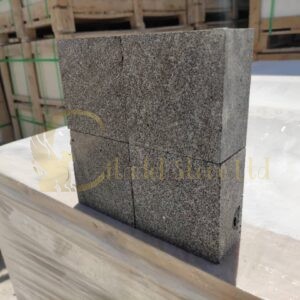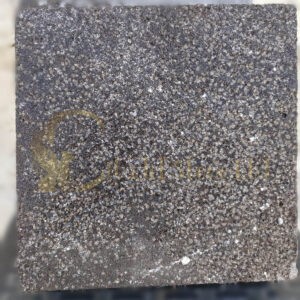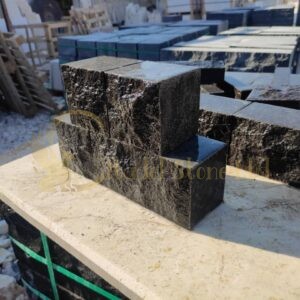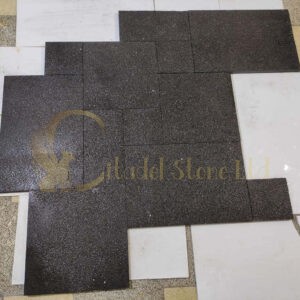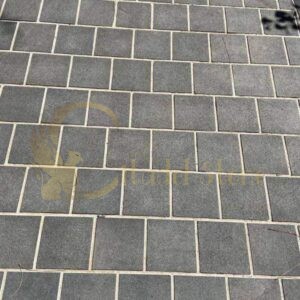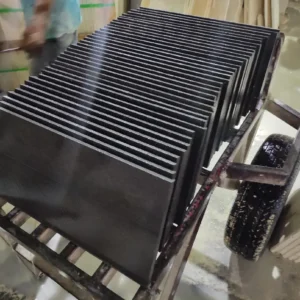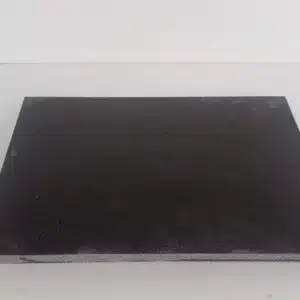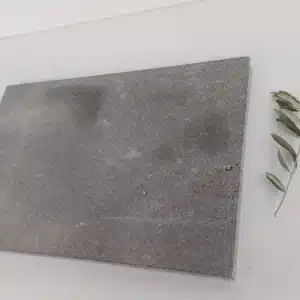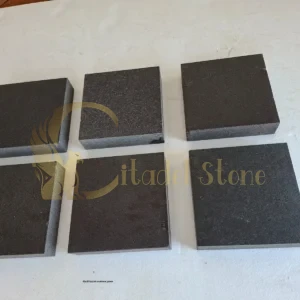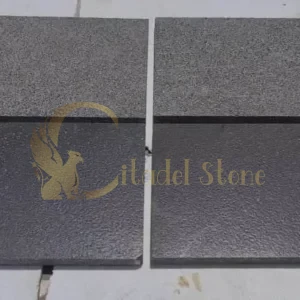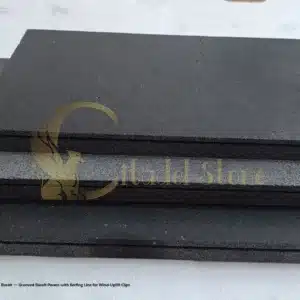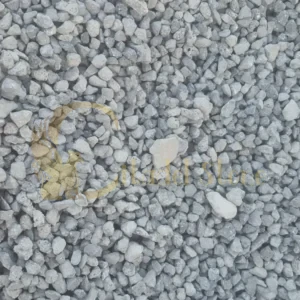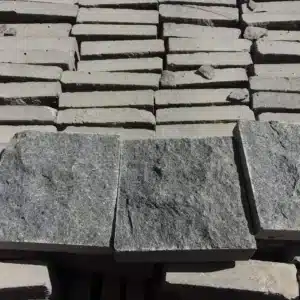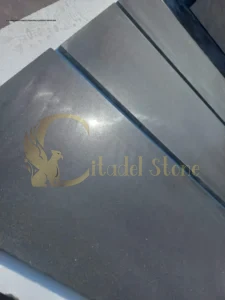Factory capabilities & production overview
Manufacturing lines
Crushing & screening lines for industrial aggregate
Process flow — from quarry to finished product
| Stage | What happens & buyer relevance |
| Quarrying | Extraction of raw basalt blocks from our proprietary quarries. This ensures a consistent and high-quality source material, with full traceability from origin. |
| Primary crushing/block extraction | Large basalt blocks are initially reduced in size. This is the foundational step for producing both architectural slabs and industrial aggregates. |
| Block sawing | Blocks are sawn into specific thicknesses for tiles, pavers, and other architectural elements. This stage ensures dimensional accuracy and consistency for final products. |
| Splitting / slab cutting | Further processing where blocks are split or cut into slabs. This step is crucial for creating various architectural formats. |
| Surface finishing | Application of various finishes such as honed, polished, flamed, or bush-hammered. This defines the aesthetic character and performance of the basalt, tailored to project specifications. |
| Quality control lab | Samples are rigorously tested in our in-house laboratory. This verifies that all products meet stringent quality standards and client specifications before proceeding. |
| Fabrication & CNC | Advanced fabrication, including CNC profiling for intricate designs and custom cuts. This allows for bespoke architectural elements and precise tolerances. |
| Packaging / palletising | Finished products are carefully packed for transit. This protects products from damage during shipping and ensures they arrive in optimal condition. |
| Dispatch / logistics | Orders are dispatched to client sites. Our logistics ensure timely and efficient delivery, with options for various shipping methods. |
Product range — architectural & industrial lines
Architectural products: tiles, pavers, slabs, coping, bespoke cut-to-size, large-format panels
Industrial products: crushed basalt gradations, sand/fines, furnace feedstock for mineral wool, refractory aggregate
- Honed: A smooth, matte finish that highlights the natural color of the basalt.
- Flamed: A textured, slip-resistant surface created by intense heat, ideal for outdoor paving.
- Sawn: A relatively smooth, uniform finish resulting directly from the sawing process.
- Brushed: A slightly textured finish achieved by brushing the stone, offering a softer feel than flamed.
- Polished: A highly reflective, glossy finish that brings out the deep tones and natural patterns of the basalt.
- Bush-hammered: A rough, textured finish with a dotted appearance, providing excellent grip.
Quality control & testing laboratory
Verification workflow for buyers
- Request Citadel Stone Technical Data Sheets (TDS): These documents provide detailed product specifications, performance characteristics, and material properties.
- Check lab accreditation: Inquire about our laboratory’s accreditation (e.g., ISO/IEC 17025) and request accreditor references to confirm our testing competence.
- Request batch reports: Obtain specific test reports for the batch of material relevant to your order, ensuring traceability and compliance.
- Consider third-party re-testing: For independent verification, buyers may opt for third-party testing of samples from their order.
- ASTM C373 (Standard Test Method for Water Absorption, Bulk Density, Apparent Porosity, and Apparent Specific Gravity of Fired Whiteware Products)
- ASTM C170 (Standard Test Method for Compressive Strength of Dimension Stone)
- Petrographic examination (for detailed mineralogical and textural analysis)
Finishing, fabrication & custom services
Finishes offered
- Honed: A smooth, non-reflective finish that brings out the natural color and character of the basalt.
- Flamed: A rough, textured finish created by intense heat, offering excellent slip resistance, ideal for exterior paving and wet areas.
- Polished: A high-gloss, reflective surface that deepens the color and highlights the inherent beauty of the stone.
- Bush-hammered: A coarse, uniformly textured finish with a pitted appearance, providing a robust, anti-slip surface.
- Sawn: A relatively even, matte finish resulting directly from the cutting process, often used as a base for further treatments or for a natural, understated look.
Edge profiles and CNC routing
Customization options
- CNC tolerances: Precision cutting to tight tolerances for demanding applications.
- Bespoke cuts: Custom dimensions and shapes for unique design requirements.
- Mitres and chamfers: Specialized cuts for seamless corners and decorative edges.
- Drilling and coring: Accurate holes for fixtures, plumbing, or electrical conduits.
- Texturing and grooving: Custom surface treatments for enhanced grip or decorative patterns.
Industrial processing for mineral wool & melting feedstock
Why basalt is used in mineral-wool and melting applications
- Chemical assay: A comprehensive analysis of the elemental composition (e.g., SiO2, Al2O3, Fe2O3, MgO, CaO, Na2O, K2O, TiO2, P2O5). This is crucial for maintaining the desired properties of the end product.
- Loss on Ignition (LOI): Measures the volatile content, indicating the presence of carbonates or organic matter that can affect melting processes.
- Sieve analysis: Determines the particle size distribution, which is vital for efficient feeding into furnaces and consistent melting.
- Moisture content: Low moisture content is preferred to prevent energy waste during melting and to avoid process disruptions.
Handling & storage best-practices for industrial feedstock
- Moisture control: Store basalt in dry conditions to prevent moisture absorption, which can impact melting efficiency and energy consumption. Covered storage facilities or waterproof tarpaulins are advisable.
- Stockpile management: Implement a first-in, first-out (FIFO) system for stockpiles to ensure material freshness and prevent degradation. Proper segregation of different basalt grades is also important.
- Dust suppression: Utilize dust suppression techniques during handling and transfer to minimize airborne particles, ensuring a safer working environment and preventing material loss.
- Contamination prevention: Protect basalt stockpiles from contamination by foreign materials, which could alter its chemical composition and affect the quality of the end product.
Industrial buyer checklist for documentation required
- Material Safety Data Sheet (MSDS): Provides essential information on the safe handling, storage, and potential hazards of the basalt.
- Chemical assay report: Detailed analysis of the basalt’s chemical composition.
- Sieve analysis report: Documentation of particle size distribution.
- Moisture content report: Verification of the basalt’s moisture levels.
- Delivery manifests: Records of shipment details, including quantity, date, and origin, for traceability.
Environmental management & sustainability
Dust & wastewater management
Energy efficiency initiatives
Reuse/recycling of cutting waste
Options to supply lower-carbon logistics
Logistics, packaging & delivery options
Palletised tile shipping
Bulk tipping for crushed basalt
Container / truckload options
Domestic LTL, FCL export
Buyer receiving checklist
- Visual inspection: Check for any visible damage to packaging or product upon arrival.
- Quantity verification: Confirm that the number of pallets, bags, or bulk volume matches the delivery manifest.
- Batch verification: Cross-reference batch numbers on packaging with order documentation to ensure consistency.
- Documentation review: Verify that all accompanying paperwork, such as delivery manifests and material safety data sheets (MSDS), is present and accurate.
Procurement & specification checklist
- Technical Data Sheets (TDS): Request the latest TDS for specific basalt products, detailing physical and chemical properties.
- Material Safety Data Sheets (MSDS): Obtain MSDS for all basalt products to ensure safe handling and compliance.
- Lab reports (ASTM): Request independent laboratory test reports, particularly for ASTM standards relevant to your application (e.g., water absorption, compressive strength).
- Chain-of-custody documentation: Verify the origin and processing history of the basalt to ensure ethical sourcing and quality control.
- Batch photos: Request photos of the specific batch of material designated for your order to confirm visual consistency.
- Sample approval: Ensure that physical samples are approved by all relevant stakeholders before placing a bulk order.
- Warranty terms: Review and understand the warranty terms and conditions provided by Citadel Stone.
- Packing list: Confirm the detailed packing list for your order, including quantities, dimensions, and weights.
- Lead times and Incoterms: Clarify estimated lead times for production and delivery, as well as the agreed-upon International Commercial Terms (Incoterms) for shipping responsibilities.
- Environmental certifications: If applicable, request documentation for any environmental certifications (e.g., ISO 14001) related to the basalt production.
- Sustainability reports: Inquire about any available sustainability reports or initiatives from Citadel Stone.
- References/case studies: Request references or case studies of similar projects where Citadel Stone basalt products have been successfully used.
Risk management, warranties & claims handling
Recommended warranty language elements to request
- Sample retention: Clauses detailing the retention of approved production samples by both parties for future comparison and quality verification.
- Batch re-test rights: Provisions allowing the buyer to request independent re-testing of a specific product batch if concerns arise regarding its conformity to specifications.
- Delivery inspection windows: Clearly defined timeframes within which the buyer must inspect delivered goods and report any discrepancies or damages.
- Material conformity: Specific criteria against which the delivered material will be judged for conformity to agreed-upon specifications.
- Remedy for non-conformity: Outlining the steps to be taken in the event of non-conforming materials, such as replacement, repair, or credit.
Contact & factory visits
How to request sample boards
Arrange a factory visit or schedule an inspection
- Safety rules: All visitors must adhere to our strict safety protocols, including wearing appropriate personal protective equipment (PPE) which will be provided.
- Lead time for visits: We request a minimum of [X] business days’ notice to arrange a factory visit or inspection, allowing us to prepare adequately and ensure the availability of relevant personnel.
Six Examples of Basalt in Commercial Spaces
The Meridian Hotel — honed basalt tiles & prefabricated pool coping
Project brief & challenge: A 28-storey luxury hotel needed durable, low-maintenance basalt for lobby floors, spa wet-areas and a rooftop pool. Challenges included strict waterproofing interfaces, exposure to pool chemicals, heavy foot traffic, and a tight opening schedule that left narrow windows for mockups and sequencing.
Citadel Stone role: Citadel acted as single-source natural stone supplier and technical partner from Design Development through closeout. We provided material selection (low-porosity honed basalt), full shop drawings for tile layouts and coping profiles, chemical-resistance test data for pool finishes, and templating for custom prefabricated coping units. Citadel coordinated with the interior architect, the pool/waterproofing contractor and the GC to agree adhesive systems compatible with membranes and to define coping anchorage that preserved the membrane warranty.
Installation & coordination: Deliveries were staged to match waterproofing cure windows; on-site training sessions reduced installer errors around edge details; mockups confirmed grout and joint width; Citadel’s site rep supervised critical transitions where coping met metal flashings and drainage scuppers.
Outcome & benefits: The hotel opened on time with minimal punch-list items. Tiles and coping resisted staining and chemical exposure in the first year; the owner reported lower maintenance time than equivalent materials. Architect and GC cited Citadel’s proactive submittals and hands-on coordination as key to preventing costly waterproofing rework.
Riverbend Promenade — heavy-duty basalt pavers, seating coping & shoreline detailing
Project brief & challenge: A waterfront civic promenade required interlocking basalt pavers for heavy pedestrian loads, prefabricated coping for seating walls, and stone detailing that tolerated splash and seasonal flooding. The project demanded ADA compliance, robust drainage, and coordination with civil stormwater works.
Citadel Stone role: Citadel partnered with the landscape architect, civil engineer and contractor to specify frost-resistant, dense basalt pavers and mechanically anchored coping. We supplied permeability and abrasion test reports, produced shop drawings tying coping to seat walls and handrails, and developed bedding and jointing details that integrated with subbase drainage. Citadel also produced wet/dry mockups to demonstrate color stability after immersion.
Installation & coordination: Material deliveries were timed to allow subbase compaction and drainage layer installation first; Citadel supervised edge restraint installs and trained the paving crew on jointing patterns that preserved permeability while meeting ADA slope tolerances. Special attention was paid to coping anchorage so seating remained secure under dynamic crowd loads.
Outcome & benefits: The promenade achieved a cohesive, durable finish with no displacement or drainage clogging in the first storm season. The city praised Citadel’s documentation and site support that streamlined inspections and acceptance.
Glasshouse Office Campus — basalt rainscreen cladding & precision anchorage
Project brief & challenge: A mid-rise office complex sought a premium basalt façade — slim panel aesthetic, tight joint widths, and concealed anchors — while meeting thermal separation, wind-load and movement joint requirements. The façade contractor needed precise, installable shop drawings and mock panels for client approval.
Citadel Stone role: Citadel engineered prefabricated basalt cladding panels with stainless-steel anchorage systems and thermal separation details compatible with the rainscreen cavity. We supplied full-scale mockups, anchor pull-test data, CNC templates for panel fabrication and installation tolerances. Citadel coordinated with the façade consultant, waterproofing subcontractor and scaffold provider to align production and site availability.
Installation & coordination: Panels were sequenced to scaffold stages to avoid onsite storage conflicts; Citadel’s field engineers adjusted anchor lengths per panel to compensate for field plumb variations and supervised flashing and termination details where cladding met window systems. A tight QA checklist ensured consistent joint widths and alignment.
Outcome & benefits: The façade met aesthetic and performance targets, with minimal field modifications. The façade contractor reported reduced adjustment time and faster panel setting than other stone systems previously used.
Interstate Rehabilitation — crushed basalt for structural base & HMA aggregate
Project brief & challenge: A regional DOT resurfacing and full-depth rehabilitation required crushed basalt for base course and high-quality coarse aggregate for HMA on a high-truck-volume route. The project had strict gradation, LA abrasion and delivery schedule requirements to avoid paving interruptions.
Citadel Stone role: Citadel managed quarry extraction, multi-stage crushing and screening to produce engineered base mixes and angular coarse aggregate meeting the DOT specs. We provided per-lot lab reports (gradation, LA abrasion, specific gravity), implemented stockpile blending to avoid segregation, and coordinated truck scheduling with the contractor and asphalt plant. Technical support included moisture conditioning recommendations and in-field sieve checks during paving.
Installation & coordination: Just-in-time deliveries reduced stockpile aging; Citadel’s QA reps performed on-site granularity checks and liaised with the paving crew on optimal compaction moisture. For base layers, we recommended lift thickness and compaction energy to meet design densities.
Outcome & benefits: Pavement lifts met density and strength requirements on first pass; the project avoided paving downtime and achieved expected lifespan improvements. The contractor credited Citadel’s batch traceability and reliable logistics.
Union Square Urban Plaza — decorative crushed basalt, permeable paver subbase & gabion cladding
Project brief & challenge: A downtown plaza redesign used basalt across visible and functional applications: decorative screenings for planters, rounded crushed basalt for permeable paving subbase, and cobble-sized basalt for gabion faces. Design demanded consistent color, low dust, and materials that supported stormwater infiltration.
Citadel Stone role: Citadel produced washed decorative screenings and graded crushed mixes tailored for permeable systems. We coordinated color sorting and stockpile protection to maintain tone consistency, supplied lab permeability data, and produced installation guidance (lift thicknesses, geotextile selection, compaction limits) for the landscape contractor. For gabions, Citadel supplied cobble and larger stones with grading certificates and rigging guidance for safe placement.
Installation & coordination: Deliveries were sequenced to the planting program; on-site acceptance testing confirmed permeability targets before paving completion. Citadel provided pre-installation training for installers on avoiding fines contamination and advised on planter drainage separation to prevent staining.
Outcome & benefits: The plaza delivered the intended visual palette and functional infiltration performance. Maintenance crews reported fewer clogging events than prior permeable trials, and the landscape architect praised the material consistency across visible features.
Central Transit Hub — basalt pavers, platform coping & interior accent tiles
Project brief & challenge: A major transit hub renovation required heavy-duty basalt pavers for platform zones, prefabricated coping for platform edges, and honed interior basalt tiles in station concourses. Key challenges included high concentrated loads, slip resistance, quick replacement access for maintenance, and coordination with MEP and signaling trades.
Citadel Stone role: Citadel specified load-rated, high-strength basalt pavers and beveled coping with removable anchor options for rapid replacement. We supplied anti-slip honed tiles for concourse areas, produced shop drawings interfacing with drainage and signaling conduits, and provided a spare-parts kit of pre-cut pavers for maintenance teams. Citadel coordinated closely with the transit authority, platform contractor and MEP subcontractors to ensure paver joints did not interfere with embedded conduits and that coping anchorage allowed stage access.
Installation & coordination: Nighttime deliveries and overnight installs minimized passenger disruption; Citadel’s field team supervised tolerance checks for ramp slopes and platform clearances. We trained maintenance staff on replacement procedures and delivered an installation and warranty manual specific to high-traffic rail environments.
Outcome & benefits: Platforms maintained slip and safety performance throughout peak operations; coping sections allowed fast replacements after an early-season incident with no service interruption. The transit authority praised Citadel’s maintenance-focused handover and the spare kit that shortened downtime.
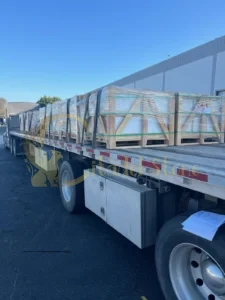
Basalt Manufacturer in the USA: Production Strengths & Specifier Checklist
Regional Manufacturing Footprints
Domestic basalt manufacturers concentrate operations close to volcanic bedrock sources—particularly in the Pacific Northwest—so buyers benefit from shorter haul distances, larger-format slab production, and quicker turnarounds. Many factories keep buffer inventories and on-site finishing to serve coastal and inland projects without long import delays.
Factory Capabilities & Product Range
Modern U.S. basalt plants offer a full slate of services: gang-saw and calibrated sawing for slabs, CNC profiling, waterjet cutting for bespoke shapes, thermal/flamed finishes for anti-slip surfaces, and paver production for heavy-use exteriors. Increasingly, manufacturers are diversifying into downstream products like crushed basalt aggregate and basalt-fiber precursors, adding resilience to their product mix.
Quality Assurance, Sustainability & Buyer Tips
When evaluating a basalt manufacturer in the USA, request mill reports, material test data (water absorption, freeze-thaw resistance, abrasion), and Environmental Product Declarations (EPDs). Verify on-site water recycling practices, waste-management plans, and any third-party certifications the factory holds. For project reliability, ask about reserve-slab programs, lead-time guarantees, and in-house mockup services. Finally, confirm compatibility notes for adhesives, grout, and radiant-heat systems to avoid costly rework.
Choosing a domestic basalt manufacturer that combines advanced fabrication, transparent documentation, and local logistics delivers predictable supply and stronger lifecycle performance—critical for architects, contractors, and owners demanding high-performance stone solutions in the U.S. market.
Conclusion & Citadel Stone CTA
- Request a sample board: See and feel the quality of our basalt firsthand.
- Download our Technical Data Sheets (TDS): Access detailed product specifications and performance data.
- Ask for a bulk quote: Get competitive pricing for your large-scale architectural or industrial needs.
- Schedule a factory tour: Witness our state-of-the-art manufacturing process and discuss your requirements with our experts.

